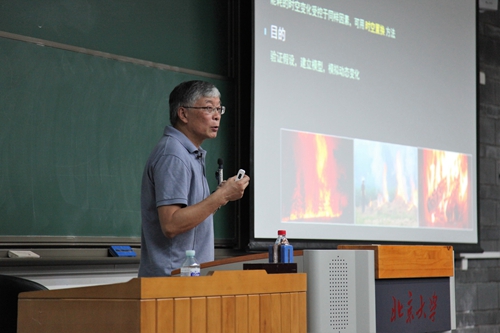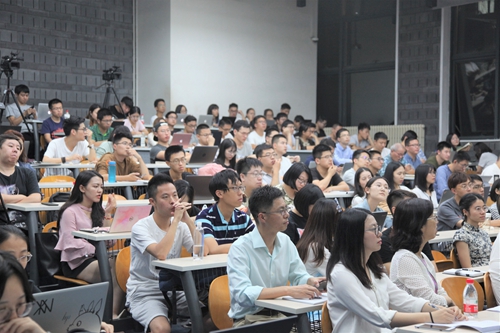Peking University, Sept. 25, 2018: On the evening of September 20th, Tao Shu, member of the Chinese Academy of Sciences and professor of the College of Urban and Environmental Sciences in Peking University, delivered a speech on the construction process of the high-resolution inventory of worldwide air pollutant emission as one of the Caizhai Academic Speech Series. Professor Tao Shu illustrated how this inventory has been applied to assessing the probable trend of future air pollutant emission in China with several examples, such as the improving air quality due to the ban on coal cooking in the Chinese countryside, and the weather’s influence on atmospheric particles pollution.

Professor Tao Shu delivering the Speech
Professor Tao thus started the lecture by introducing the health problems caused by air pollution. According to his lecture, air pollution, both outdoor and indoor, should be viewed with equal significance in terms of negative effects, though the latter is more likely to be neglected by the public. Therefore, Law of the People's Republic of China on the Coal Industry was enacted to regulate the industrial emission of air pollutants, while the regulations on clean heating in winter laid more emphasis on daily control. As a result, in order to improve the relevant policies of controlling air pollutants, Professor Tao and his team have been working on this space-time scale, multi-dimensional high-resolution air pollutant emission inventory for more accurate observations and data. He also stressed that some adjustments on Chinese energy structure, like replacing part of the coal with electricity and gas, would help decrease pollution in the future.

During the Lecture
When the lecture came close to conclusion, Professor Tao Shu patiently answered the questions about the significance of this air pollutant emission inventory project and wished the present undergraduates can achieve the academic goals in this field.
Written by: Wang Nini
Edited by: Xu Liangdi
Source: Graduate School of Peking University
